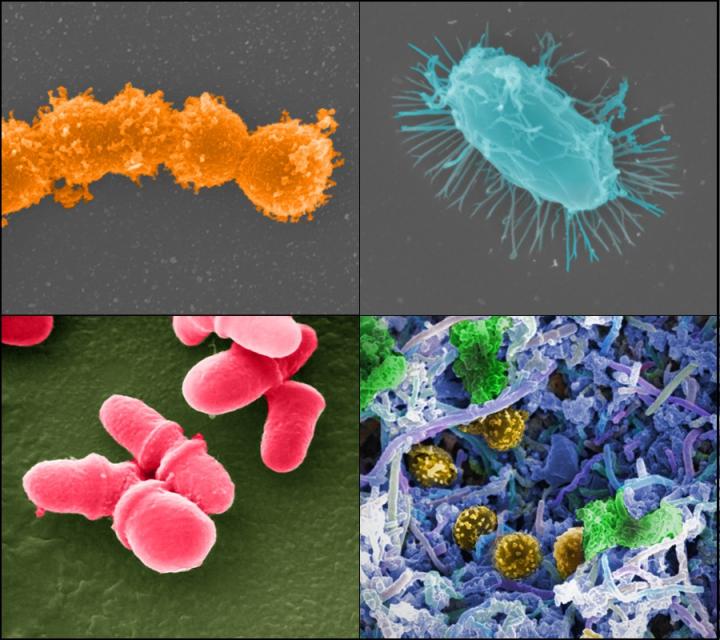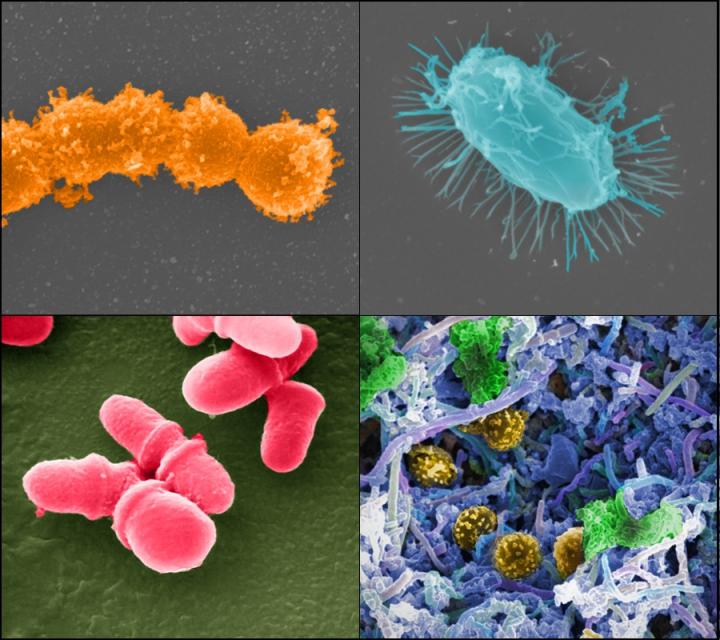
Credit: Jonathan Bailey, NHGRI
Researchers at Memorial Sloan Kettering Cancer Center have shown that autologous fecal microbiota transplantation (auto-FMT) is a safe and effective way to help replenish beneficial gut bacteria in cancer patients who require intense antibiotics during allogenic hematopoietic stem cell transplantation. In their study, patients who underwent the procedure were randomly assigned into two groups: one group received standard care and the other received auto-FMT. The researchers found that auto-FMT resulted in the recovery of beneficial gut bacteria to near baseline levels within days, thus restoring patients' digestive, immune and other essential functions. With standard care, beneficial bacteria typically take many weeks to recover from antibiotic treatment, leaving patients at risk of other infectious diseases, including Clostridium difficile.
The National Institute of Allergy and Infectious Diseases, part of the National Institutes of Health, provided funding for part of the project. The study report appears in Science Translational Medicine.
"This important study suggests that clinical intervention using auto-FMT can safely reverse the disruptive effects of broad-spectrum antibiotic treatment," says NIAID Director Anthony S. Fauci, M.D. "If validated in larger studies, this approach may prove to be a relatively simple way to quickly restore a person's healthy microbiome following intensive antimicrobial therapy."
Allogenic hematopoietic cell transplantation involves a donor–often but not exclusively a family member–who gives the recipient stem cells that re-establish bone marrow production of blood cells and immune function to combat cancer. Antibiotics are essential to prevent bacterial infections in stem cell recipients. However, antibiotics also destroy beneficial bacteria that enhance immune function and resistance to infection. The loss of beneficial bacteria increases the risk of certain life-threatening infectious diseases and graft-versus-host disease (GVHD).
The study involved cancer patients who provided their own fecal sample, which was frozen and stored prior to their cell transplantation procedure. Weeks later, when physicians confirmed that the transplanted cells were growing, they assessed the status of the patients' beneficial gut bacteria. The first 25 patients who lacked known beneficial bacteria were enrolled into the study and randomly assigned to the different treatment groups: 14 received auto-FMT by enema and 11 received standard-of-care.
The patients who received auto-FMT consistently regained bacterial diversity, composition and function; recovery of beneficial bacteria in the 11 control patients was delayed.
The researchers are continuing to monitor the study patients to determine if auto-FMT improves patient outcomes, such as the incidence and severity of bacterial, viral and fungal infections and the incidence and severity of GVHD. Whether FMT from a healthy donor would be as beneficial as the patient's own fecal sample at restoring beneficial bacteria remains to be studied.
###
This research was supported by NIH grant U01 AI12427. Clinical Trial NCT02269150.
Reference: Y Taur et al. Microbiota-remediation after antibiotic-induced loss of commensal bacteria. Science Translational Medicine. DOI: 10.1126/scitranslmed.aap9489 (2018).
NIAID conducts and supports research–at NIH, throughout the United States, and worldwide–to study the causes of infectious and immune-mediated diseases, and to develop better means of preventing, diagnosing and treating these illnesses. News releases, fact sheets and other NIAID-related materials are available on the NIAID website.
About the National Institutes of Health (NIH): NIH, the nation's medical research agency, includes 27 Institutes and Centers and is a component of the U.S. Department of Health and Human Services. NIH is the primary federal agency conducting and supporting basic, clinical, and translational medical research, and is investigating the causes, treatments, and cures for both common and rare diseases. For more information about NIH and its programs, visit http://www.nih.gov.
Media Contact
Ken Pekoc
[email protected]
301-402-1663
@NIAIDNews
http://www.niaid.nih.gov
Original Source
https://www.niaid.nih.gov/news-events/fecal-microbiota-transplantation-helps-restore-beneficial-bacteria-cancer-patients http://dx.doi.org/10.1126/scitranslmed.aap9489





